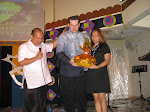
What a Believing Community Can Do to Deal with Difficulties (Part 1)
James 4:13-5:11
James 4:13-17
13Come now, you who say, "Today or tomorrow we will go to such and such a city, and spend a year there and engage in business and make a profit."
14Yet you do not know what your life will be like tomorrow. You are just a vapor that appears for a little while and then vanishes away.
15Instead, you ought to say, "If the Lord wills, we will live and also do this or that."
16But as it is, you boast in your arrogance; all such boasting is evil.
17Therefore, to one who knows the right thing to do and does not do it, to him it is sin.
James 5:1-11
1Come now, you rich, weep and howl for your miseries which are coming upon you.
2Your riches have rotted and your garments have become moth-eaten.
3Your gold and your silver have rusted; and their rust will be a witness against you and will consume your flesh like fire. It is in the last days that you have stored up your treasure!
4Behold, the pay of the laborers who mowed your fields, and which has been withheld by you, cries out against you; and the outcry of those who did the harvesting has reached the ears of the Lord of Sabaoth.
5You have lived luxuriously on the earth and led a life of wanton pleasure; you have fattened your hearts in a day of slaughter.
6You have condemned and put to death the righteous man; he does not resist you.
7Therefore be patient, brethren, until the coming of the Lord. The farmer waits for the precious produce of the soil, being patient about it, until it gets the early and late rains.
8You too be patient; strengthen your hearts, for the coming of the Lord is near.
9Do not complain, brethren, against one another, so that you yourselves may not be judged; behold, the Judge is standing right at the door.
10As an example, brethren, of suffering and patience, take the prophets who spoke in the name of the Lord.
11We count those blessed who endured you have heard of the endurance of Job and have seen the outcome of the Lord's dealings, that the Lord is full of compassion and is merciful.
Introduction
Last week’s message dealt with what the Christian church can contribute to building a peaceful and just society. The premise was that the church is to be in the forefront of promoting maturity and discipline, true wisdom, and humility.
The fourth message in our series is about what we can do to deal with difficulties. James wrote to dispersed Jewish Christians. As such, they were under difficult situation, struggling to make sense of their status. The paragraph we are dealing with today is found in at the close of James’ epistle. It served as ‘road signs’ to ensure a safe and successful journey for this bunch of deported Jewish believers.
The message of James to this 1st century believing community can be useful for the 21st century Christians as well. Let’s take a look at these ‘road signs’:
I. Consider God’s Will (4:13-17)
When difficulty strikes consider God’s will. This section is addressed to rich Christians who are living and managing their businesses the way the world does. They don’t care so much about God’s will. They act like they are the real masters of their own lives. “…you boast in your arrogance; all such boasting is evil” said James (4:16). Life is just a tiny speck in the light of eternity. We are like a vapor that billows up for a little while and disappears. In this regard, considering God’s will in every decision is very important.
Instead of saying "Today or tomorrow we will go to such and such a city, and spend a year there and engage in business and make a profit", you should say "If the Lord wills, we will live and also do this or that." We should never act as if we are in full control of what will happen tomorrow. A few years back, there was a song that says “it’s my life…” I will do whatever I want, it’s my life anyway. Yes, it’s your life but God is the giver of life and he holds the sole right to direct that life of yours.
Since life is too short and nobody knows what will happen tomorrow, we ought to entrust to God even the smallest details of our being and let His will take its rightful place. If we fail to do what we ought to do we are committing a sin. Procrastination is not an option. Every serious Christian ought to do what he needs to do.
II. Do not Abuse your Employees (5:1-6)
Another road sign says, “do not abuse your employees” (5:1-6). This portion is intended for unbelieving rich who oppress the poor. The main reason for these abuses is the negative effect of wealth to these people. James condemns these effects not the rich. The Bible declares that “the love of money is the root of all kinds of evil” (1 Tim. 6:10). We definitely need money to live and do businesses, pay our bills, send our kids to school, and buy what we need. We need money to go on with the ministry.
Money is not evil in itself it is the love of money that leads one to abuse the people that are working for them. James declared that these kinds of people are storing up evidences for the coming judgment day. It is very interesting to note that the cries of the oppressed poor are reaching the throne of God. In the book Exodus the same statement is found when the cries of Israelites reached the ears of the Lord (Exo. 3:7). The people of God were experiencing terrible oppression courtesy of the Egyptians. God’s heart is always close to those who are oppressed (Matt. 5:10, 11).
If you are a boos, an owner of a company, a supervisor, a manager, a principal or owner of a school, a mother or a father, whatever your career may be the warning from the epistle of James rings very clear: “Do not abuse the people around you especially those who are close to you and working hard for you.” Give what’s due for them and do not use your money to oppress them. Manage your people using God’s standards rather than the world’s standard.
III. Be Patient (5:7-11)
In this section, James turns his attention once again to the poor who are oppressed by the wealthy in 5:1-6. He exhorts them to be patient in the light of the coming of the Lord. The coming of the Lord brings hope for the poor and the oppressed. This hope will help them persevere and be patient for they know that God will surely return to reward them. He used the example of a farmer who patiently waits for the harvest. The “early and late rains” refer to the short rainy periods in Palestine before and after the main rainy season probably in November through April.
To be patient is “to be able to bear pains or trials without complaint.” This definition is fitting for a believing community who was suffering from pains and trials. They need to practice this virtue to be able to emerge victorious from the difficulties of being persecuted outside of their homeland.
Just like Job who patiently endured the severe trials that struck his life and the life of his entire family and possessions. He emerged triumphant from the tragedies and God restored to his possession all the things that were taken from him. God blessed him twice as much as before (Job 42: 10). In the New Testament, we have the best example of patience. Jesus Christ the begotten Son of God endured the sufferings and death on the cross. He is our ultimate example.
There is no room for grumbling for if we grumble God’s judgment will fall on us. We are not to blame and judge others for our miseries. God has the sole right to judge us based on our own deeds. Just like a farmer, Job, ultimately Jesus Christ let us practice patience as a true blooded Filipino. Filipinos laugh at tragedies, we always find time to relax and entertain ourselves after a long and tiring day. The vernacular terms “pagtitiis” or “tiyaga” indicates a strong determination to go on with life despite constant rains, typhoons, floods, rising prices of commodities, and other sorts of hardship as part of living in the Philippines. This Filipino virtue can be easily translated into our life as Filipino Christians in order to manage difficulties.
Conclusion
In his book ‘You’ve Got What It Takes’, Dave Grant explained the difference between a ‘reaction’ and a ‘response.’ People who ‘react’ to situations in life use the pronoun “YOU”. When they experience difficulties, they jump out of character and blame others.
People who ‘respond’ to situations use the pronoun “I.” They make things happen because they’re in control of their own feelings. They tell people what they feel without blaming that person for their misfortunes.
Jesus was consistent in responding rather than reacting to the circumstances of life. He is aware that we face many pressures in life as a believing community. He wants us to follow His example. When things go wrong, respond by considering God’s will, being kind to people who work under your supervision, and practice patience.












